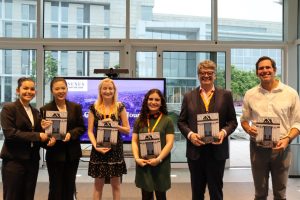By Junyan Li, class of 2026

The Humanities community at Duke Kunshan University recently hosted its third annual Undergraduate Humanities Research Conference on April 26th and 27th at the Academic Building. Co-hosted by Professor James Miller from DKU, and Professor Carlos Rojas from Duke, the event served as a platform for researchers and students from diverse backgrounds across China and abroad to share their insights and research findings. More than 120 individuals registered for the conference.
This year’s theme, “Superdeep,” was inspired by an ecosystem of activities at DKU designed by Professor Nathan Hauthaler, which aimed to stimulate philosophical thinking in its most expansive sense.
Vice Chancellor for Academic Affairs Scott MacEachern addressed the conference, highlighting that this annual gathering has evolved into a significant event that strengthens the bonds within the humanities community.
The conference schedule included four keynote lectures and twelve parallel sessions featuring contributions from students not only from DKU but also from universities across China. The discussions covered a broad spectrum of topics, ranging from literature and art to gender and power, and extending to beliefs, philosophy, and globalization.

DKU was more than delighted to welcome four keynote lecturers. (Chenshan Tian) discussed the Confucian philosophy of family feeling (qinqing), exploring Confucian philosophy as a potential resource for a new geopolitical order. Associate Professor Ru Ye from Wuhan University delivered a thought-provoking lecture titled “Can Rational Beliefs Be Arbitrary?” This sparked deep contemplation among the audience about the possibility of multiple rational responses to the same body of evidence. Hao Tang, Professor of Philosophy from Tsinghua University, led a discussion on attention and practical knowledge, enriching the concept of practical knowledge as a form of self-knowledge or self-consciousness. Seth Jaffe, Associate Professor of the History of Political Thought at LUISS, provided a unique interpretation of Thucydides’ account of the causes of war, delving into debates surrounding the “inevitability” of conflict between America and China.
The central premise of this conference is that while not everyone may be a professional philosopher, we can all benefit from engaging more deeply with the intellectual tools that philosophers are developing.
Jackson Li, a sophomore at DKU, found inspiration in the diverse topics presented, particularly resonating with Jaffe’s perspective. He commented, “Applying ancient Greek stories to modern international relations offers a compelling way to consider the complexity of relations between great powers. It suggests that cooperation between China and the United States is a crucial prerequisite for a mutually beneficial situation.”
In addition to the keynote speakers, student presentations in the parallel sessions also brought fresh insights to the conference. Xi Xiong, a junior majoring in philosophy from Wuhan University, expressed her pleasure in exploring topics that have previously been overlooked or unnoticed, with the aim of eliminating hidden evaluative bias within the field of philosophy.

Renyuan Zhang, another DKU sophomore, reflected on his journey from being a participant last year to a presenter this year, stating, “My role in the HRC may have changed, but the spark of enlightenment remains.”

The conference was not solely about academic discussions; it also incorporated social events such as a gala dinner, a music and dance night, and student film festival, creating a relaxed atmosphere after a day of intellectual engagement.
Professor Miller expressed pride in what the HRC has achieved, not only fostering intense academic discussions in humanities but also providing “a warm and rich social atmosphere with food and wine to help build a shared community of learning.” He noted that over the years, DKU students have formed friendships with their peers at other universities through these conferences, which he described as “beautiful to see.”
Echoing Miller’s sentiments, DKU sophomore Yuequ Dou said, “It’s amazing to hear all the interesting thoughts that people brought up and to make connections with friends all over China.”
The conference indeed served to reinforce Duke Kunshan University’s (DKU) brand identity as China’s premier global liberal arts university. The mission of the Humanities Research Center is to advance interdisciplinary research in the arts, humanities, and interpretive social sciences, contributing to DKU’s goal of becoming one of the world’s leading cross-cultural, research-intensive liberal arts universities.
This year’s event was particularly notable for the launch of the Nexus Journal, a humanities and social science journal created by and for undergraduates at DKU and Duke. This initiative not only strengthens DKU’s brand identity but also fosters a platform for intellectual discourse and exchange in the arts, humanities, and interpretive social sciences. It’s a testament to DKU’s commitment to advancing interdisciplinary research and contributing to its mission of being a leading global liberal arts university.

Miller expressed his appreciation for everyone’s enthusiasm, adding, “Hosting the conference with my co-director from Duke, Carlos Rojas, was a bittersweet experience for me, as this is my last semester as co-director. I wish the center every success in the future.”